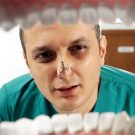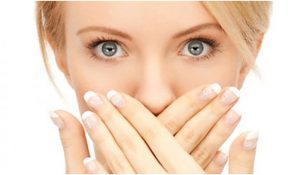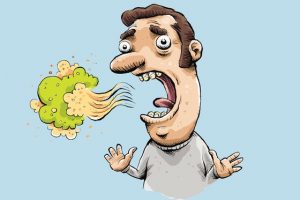Dental Health And Bad Breath

Article from WEBmd.com
Bad breath, medically called halitosis, can result from poor dental health habits and may be a sign of other health problems. Bad breath can also be made worse by the types of foods you eat and other unhealthy lifestyle habits.
How Does What You Eat Affect Breath?
Basically, all the food eaten begins to be broken down in your mouth. If you eat foods with strong odors (such as garlic or onions), brushing and flossing — even mouthwash — merely covers up the odor temporarily. The odor will not go away completely until the foods have passed through your body.
Why Do Poor Habits Cause Bad Breath? 
If you don’t brush and floss teeth daily, food particles can remain in your mouth, promoting bacterial growth between teeth, around the gums, and on the tongue. This causes bad breath. Antibacterial mouth rinses also can help reduce bacteria.
In addition, odor-causing bacteria and food particles can cause bad breathif dentures are not properly cleaned.
Smoking or chewing tobacco-based products also can cause bad breath, stain teeth, reduce your ability to taste foods, and irritate your gums.
What Health Problems Are Associated With Bad Breath?
Persistent bad breath or a bad taste in the mouth may be a warning sign of gum (periodontal) disease. Gum disease is caused by the buildup of plaque on teeth. Bacteria cause the formation of toxins to form, which irritate the gums. If gum disease continues untreated, it can damage the gums and jawbone.
Other dental causes of bad breath include poorly fitting dental appliances, yeast infections of the mouth, and dental caries (cavities).
The medical condition dry mouth (also called xerostomia) also can cause bad breath. Saliva is necessary to moisten the mouth, neutralize acids produced by plaque, and wash away dead cells that accumulate on the tongue, gums, and cheeks. If not removed, these cells decompose and can cause bad breath. Dry mouth may be a side effect of various medications, salivary gland problems, or continuous breathing through the mouth.
Many other diseases and illnesses may cause bad breath. Here are some to be aware of: respiratory tract infections such as pneumonia or bronchitis, chronic sinus infections, postnasal drip, diabetes, chronic acid reflux, and liver or kidney problems.
 What Can I Do to Prevent Bad Breath?
What Can I Do to Prevent Bad Breath?
Bad breath can be reduced or prevented if you:
Practice good oral hygiene. Brush twice a day with fluoride toothpaste to remove food debris and plaque. Brush teeth after you eat (keep a toothbrush at work or school to brush after lunch). Don’t forget to brush the tongue, too. Replace your toothbrush every 2 to 3 months or after an illness. Use floss or an interdental cleaner to remove food particles and plaque between teeth once a day. Rinse with an antibacterial mouthwash twice a day. Dentures should be removed at night and cleaned thoroughly before being placed in your mouth the next morning.
See your dentist regularly — at least twice a year. He or she will conduct an oral exam and professional teeth cleaning and will be able to detect and treat periodontal disease, dry mouth, or other problems that may be the cause of bad mouth odor.
Stop smoking and chewing tobacco-based products. Ask your dentist for tips on kicking the habit.
Drink lots of water. This will keep your mouth moist. Chewing gum (preferably sugarless) or sucking on candy (preferably sugarless) also stimulates the production of saliva, which helps wash away food particles and bacteria. Gums and mints containing xylitol are best.
Keep a log of the foods you eat. If you think they may be causing bad breath, bring the log to your dentist to review. Similarly, make a list of the medications you take. Some drugs may play a role in creating mouth odors.
Get more info on this subject @ WEBmd.com
Contact Your Benefit Consultant
Have more questions? Contact Us @ 1-800-647-8421


Recent Comments